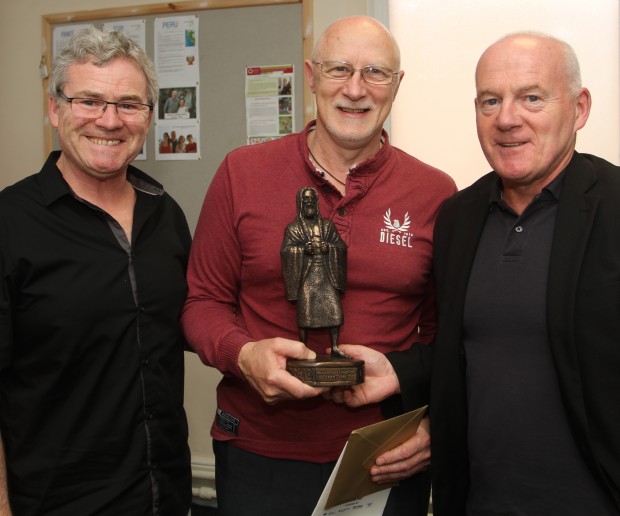12 September 2016
State failing Good Friday Agreement commitments to political ex-prisoners

Manager Tommy Quigley and chairperson Paul O'Neill present Tar Isteach's counselling co-ordinator Joe Barnes with a bronze statuette on the completion of his masters degree in counselling
THE COMMITMENT of republican ex-political prisoners to their communities was once again highlighted when Paul O’Neill, chairperson of North Belfast based Tar Isteach, told its AGM on Friday 26 August that “we as an organisation have managed to survive” and continue to deliver a high level of service despite the loss of our funding”.
As with all ex-prisoner groups concerned with the delivery of services to the political ex-prisoner community and the wider population the loss of key funding has undermined the work they do yet the commitment of staff has ensured they still function at a high level.
O’Neill outlined the extent of the work Tar Isteach is involved in and commended the advice workers who “fill upwards of 80 planned appointments per week and deal with an average of 5 emergency appointments daily. They also respond to as many as 20 telephone inquiries per day.
“In addition we have a training and employment placement from the Ashton Centre and homework sessions for young people and we are involved in various other programmes within our communities”.
The New Lodge man pointed out that whereas the British government provided £500million to pay retiring RUC members substantial redundancy payments as part of the Patton reforms on policing in the North, the political ex-prisoner community survived on “piecemeal European Peace funds, the republican ex-prisoner constituency was never adequately resourced” or provided with “properly programmed support measures”.
The wider implications of this for political former prisoners lies in the continued failure to fulfil the commitments made in both the Good Friday and St Andrew’s Agreements “as it currently stands, a criminalisation agenda remains in place” said O’Neill.
Welfare Rights Manager Agnes Fraser reinforced O’Neill’s assertion that the demand for Tar Isteach’s services has only increased with the Tory onslaught on welfare services when she said in her report that in the four months between the start of April and the end of July advice workers dealt with almost 1,100 cases.
“The people we are dealing with continue to struggle against the backdrop of benefit cuts and the economic uncertainty created by Tory welfare policies” asserted Fraser.
According to Joe Barnes in his counselling report this uncertainty also impacts on counselling services provided by not only Tar Isteach but “those counselling agencies who are being asked to work with the complexity of trauma, addiction, depression, anxiety and various forms of abuse”.
“While the community sector struggles with financial survival and political ex-prisoners and their families have not been supported by the government in accordance with the Good Friday Agreement (GFA), billions of pounds of tax payers money has gone to support the welfare of state forces.
“This [embeds] a narrative of the conflict that creates a hierarchy of ‘worth’ and ‘blame’ which is not what the peace process should be about”.
Added Barnes said “it is sobering, on the 35th anniversary of the Hunger Strike, to think that a screw [prison officer] who was working in the H Blocks at that time could retire with a one-off payment of £120,000 and an annual pension of £18,500.
“Most of the former prisoners from the time will have to rely on the basic state pension”.
However on a more hopeful the project’s manager Tommy Quigley reported that he and representatives from the wider Coiste network met with the ‘Fresh Start Panel’ and raised “all the issues effecting political ex-prisoners and their families.
“On reading the report” said Quigley “we were satisfied to the degree with which issues we raised were commented on”.
Citing from the report Quigley noted that “the impact of Troubles-related convictions remains long after the sentence has been served. These obstacles are also sometimes encountered by political ex-prisoners' relatives, which can add to the sense of disenfranchisement amongst the families of ex-prisoners”.
Quigley welcomed the panel’s recommendations such as calling for the implementation of the employers’ guidance and committing resources to sustain the activities and services the political ex-prisoners groups were established to provide.
“Ultimately we want to see the records of political ex-prisoners expunged” asserted Quigley “in accordance with the United Nations policy on Disarmament, Demobilisation and Reintegration (DDR)”.
Quigley finished by saying that “despite the difficulties and challenges facing us we will maintain the level of services we deliver and continue to champion the rights of the political ex-prisoner community, their families and the wider community”.
Follow us on Facebook
An Phoblacht on Twitter
Uncomfortable Conversations

An initiative for dialogue
for reconciliation
— — — — — — —
Contributions from key figures in the churches, academia and wider civic society as well as senior republican figures






